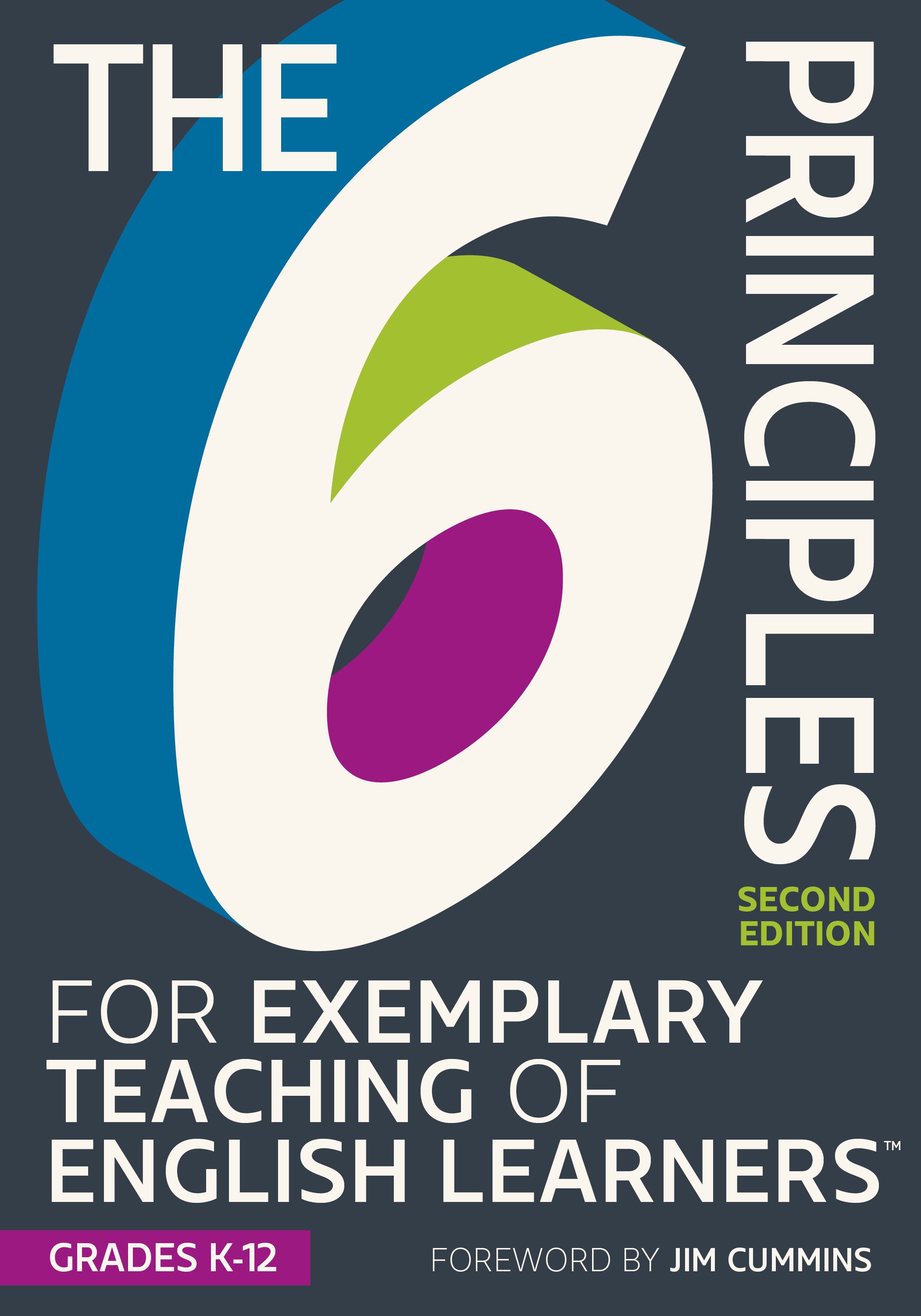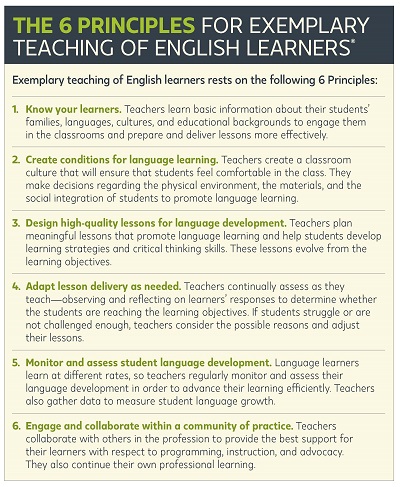PD Highlight: The 6 Principles for Exemplary Teaching of English Learners, Grades K–12 (Second Edition)
 TESOL has recently released the second edition of their bestselling The 6 Principles for Exemplary Teaching of English Learners®: Grades K–12, and I had a chance to read through it. TESOL originally conceptualized the 6 Principles initiative in 2017 in order to disseminate exemplary English language teaching practices. The 6 Principles are universal guidelines drawn from decades of research in language pedagogy and language acquisition theory that will help educators to:
TESOL has recently released the second edition of their bestselling The 6 Principles for Exemplary Teaching of English Learners®: Grades K–12, and I had a chance to read through it. TESOL originally conceptualized the 6 Principles initiative in 2017 in order to disseminate exemplary English language teaching practices. The 6 Principles are universal guidelines drawn from decades of research in language pedagogy and language acquisition theory that will help educators to:
-
- respect, affirm, and promote students’ home languages and cultural knowledge and experiences as resources
- celebrate multilingualism and diversity
- support policies that promote individual language rights and multicultural education
- guide students to be global citizens
Aimed primarily at English language development, bilingual, and dual language teachers, the principles apply equally to anyone working with multilingual learners of English, including those in content areas, administrative roles, instructional coaches and teacher educators.
The 6 Principles as Part of Professional Development
The 6 Principles for Exemplary Teaching of English Learners: Grades K–12, Second Edition contains standalone reflection questions and checklists that make it a valuable tool as a self-study resource for individual PD, and the new edition’s discussion questions in Appendix C expand on the possibilities of using it for schoolwide PD or as part of a teacher training program.
Overview
Written by a team of seven TESOL writers, The 6 Principles for Exemplary Teaching of English Learners: Grades K–12, Second Edition is a highly comprehensive guide that delves into theory as well as offers multiple practical applications, online resources, and real-world examples of The 6 Principles in action in a variety of classroom settings and content areas. This newly updated edition was unveiled at the TESOL 2024 convention in Tampa, Florida, USA.
Divided into six chapters, the book opens with TESOL’s vision for exemplary teaching of multilingual learners of English, the six principles, and a look at language learning past and present. The second chapter presents foundational information about second language learning, including the five basic language components required for competency. Chapter 3 illustrates classroom practices for each of the principles, Chapters 4 and 5 highlight additional roles for teachers of multilingual learners of English as well as support staff and administrators, and the final chapter features The 6 Principles applied to higher ed and professional development.
Throughout the book, helpful charts give insights into language components and language skills, characteristics of proficient academic English, English language development goals, types of words to learn, sample language and content objectives, strategies and techniques for improving comprehensibility, language practice techniques throughout a lesson, and sample lesson plans for select activities.
The book is rounded out with a list of common acronyms in the field of English language teaching, a 6 Principles checklist, discussion questions, and a glossary. Other titles in the series focus on The 6 Principles applied to adult education and workforce development, academic and specific purposes, and young learners.
Updates to the Second Edition
Notable changes to the second edition include the updated verbiage multilingual learner of English, an asset-based term that also celebrates linguistic diversity in our student population.
There is also a greater emphasis on student assets, the role of learners’ home languages, and culturally responsive teaching; an enhanced focus on the role of technology, literacy development, and social-emotional learning (SEL); and discussion questions for study groups.
The book also addresses the impact of the COVID-19 pandemic on multilingual learners of English, including discrepancy of access to technology and resources, and highlights the fact that the academic success of multilingual learners of English must be the job of all teachers in a school, not just English language specialists or teachers. Students’ home languages should be recognized and utilized as a tool to assist with academic English and understanding of content.
Dynamic Bilingualism as a 21st-Century Goal
According to The Translanguaging Classroom, by García, Ibarra Johnson, and Seltzer, dynamic bilingualism is the ability to adapt to communicative situations and use more than one language flexibly and strategically to make meaning, depending on the audience, conversation partner, or topic. TESOL supports multilingualism and multicultural literacy as an educational goal for all multilingual learners of English. Peppered throughout The 6 Principles are multiple real-world examples of teacher and student interactions including translanguaging and the use of home languages to develop literacy skills and promote cross-linguistic transfer.
Additional Resources
-
- The 6 Principles Online resource page features multiple videos and downloadable resources.
- Practical Applications of TESOL’s The 6 Principles for Exemplary Teaching of English Learners (PDF, American English at State)
- TESOL Modular Education (ME) offers a six-part self-paced course on The 6 Principles.


